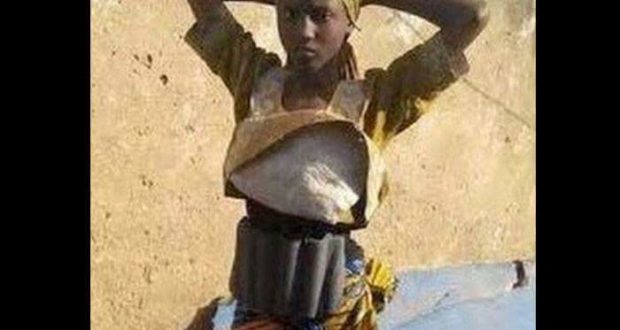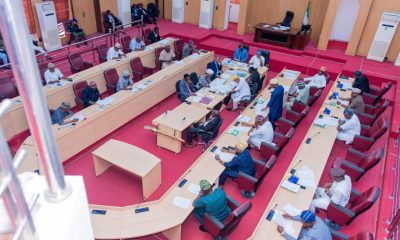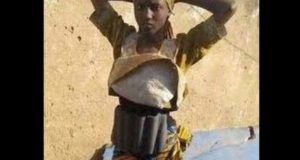News
27 Children Used For ‘Suicide’ Attacks In 3 Months — UNICEF

As Nigeria marks the third anniversary of the abduction of over 200 schoolgirls from the Chibok community, the United Nations International Children’s Emergency Fund (UNICEF), on Wednesday, revealed that there is an alarming surge in the number of children used in Boko Haram bomb attacks this year, 27 were used in the Lake Chad conflict in the first quarter of 2017.
The above figure, UNICEF said in a newly released report, is only compared to nine children that were used over the same period last year.
“In the first three months of this year, the number of children used in bomb attacks is nearly the same as the whole of last year – this is the worst possible use of children in conflict,” UNICEF’s Regional Director for West and Central Africa, Marie-Pierre Poirier, said.
The increase reflects an alarming tactic by the insurgents, according to the report ‘Silent Shame: Bringing out the voices of children caught in the Lake Chad crisis’.
So far, 117 children have been used to carry out bomb attacks in public places across Nigeria, Chad, Niger and Cameroon since 2014: four in 2014, 56 in 2015, 30 in 2016 and 27 only in the first three months of 2017.
Girls have been used in the vast majority of these attacks.
As a consequence, girls, boys and even infants have been viewed with increasing fear at markets and checkpoints, where they are thought to carry explosives.
“These children are victims, not perpetrators. Forcing or deceiving them into committing such horrific acts is reprehensible,” Poirier said.
The report provides troubling accounts by children, who were held in captivity at the hands of Boko Haram.
It equally shows how the children are met with deep suspicion when they return to their communities.
In interviews, many children, who have been associated with Boko Haram, report that they keep their experience secret because they fear the stigmatisation and even violent reprisals from their community.
Some are compelled to bear their horrors in silence as they remove themselves from other groups for fear they might be outed and stigmatised.
The report also highlighted the challenges that local authorities face with children, who have been intercepted at checkpoints and taken into administrative custody for questioning and screening, raising concerns about the prolonged periods of custody.
In 2016, almost 1,500 children were under administrative custody in the four countries.
UNICEF calls on parties to the conflict to commit to the following actions to protect children in the region.
End grave violations against children by Boko Haram including the recruitment and use of children in armed conflict as so-called ‘suicide bombers’.
18-year old Amina, who was intercepted by men of the Nigeria Security and Civil Defence Corps (NSCDC) last February, said that she was given N200 to execute the mission she was sent by the Boko Haram
Move children from a military to civilian environment as quickly as possible.
Children, who have been taken into custody solely for their alleged or actual association to armed groups, should be immediately handed-over to civilian authorities for reintegration and support.
Handover protocols should be in place in each of the four countries for children encountered during military operations.
Provide care and protection for separated and unaccompanied children.
All children affected by the crisis need psychosocial support and safe spaces to recover.
In 2016, UNICEF reached over 312,000 children with psychosocial support in Nigeria, Chad, Cameroon and Niger, and reunited more than 800 children with their families.
UNICEF is working with communities and families to fight stigma against survivors of sexual violence and to build a protective environment for former abductees.
In a crisis that has displaced more than 1.3 million children, UNICEF also supports local authorities to provide safe water and life-saving health services; restore access to education by creating temporary learning spaces; and deliver therapeutic treatment to malnourished children.
The response to this crisis remains severely underfunded.
Last year, UNICEF’s $154 million appeal for the Lake Chad Basin was only 40 percent funded.
UNICEF promotes the rights and wellbeing of every child, in everything it does.
Together with its partners, it operates in 190 countries and territories to translate that commitment into practical action, focusing special effort on reaching the most vulnerable and excluded children, to the benefit of all children, everywhere.
18-year old Amina, who was intercepted by men of the Nigeria Security and Civil Defence Corps (NSCDC) last February, said that she was given N200 to execute the mission she was sent by the Boko Haram
-

 Entertainment4 days ago
Entertainment4 days agoNigerian Singer, Ifunanaya, Died After Snake Bite In Abuja
-

 Opinion5 days ago
Opinion5 days agoBola Oyebamiji: Beyond Skelewu Dancer: The Rising Technocrat Poised To Govern Osun State In 2026 By Wale Atoba
-

 News4 days ago
News4 days ago20-Year-Old College Student Found Dead With Body Parts Missing In Kogi
-

 News5 days ago
News5 days agoOsun Assembly Warns UBA, Oyetola, APC Over Alleged Diversion Of Osun LG Funds



